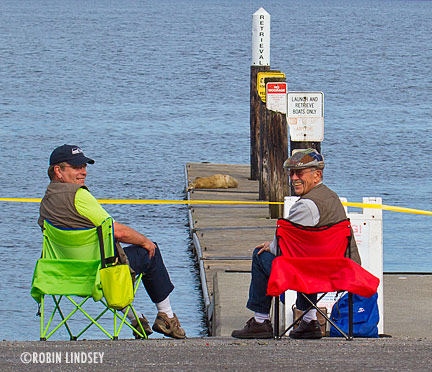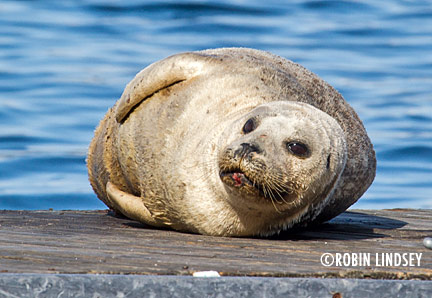Jellybean
Adult female seal chooses dangerous location to rest
Oct/05/14 09:08 AM
As of Friday, a struggling adult female harbor seal continued to choose the ever-perilous Don Armeni boat launch as her resting place. Rising tempers from a few unenlightened and hostile fishermen added to the stress of Seal Sitters MMSN volunteers who attempted to keep her safe under the guidelines of the Marine Mammal Protection Act - and keep the peace with boaters at the sometimes busy ramp. We want to emphasize that the vast majority of fishermen who used Don Armeni during the days that Jellybean sought refuge there were generous and accommodating to her presence. However, it only takes an irate few to turn a difficult situation into a dangerous one for a compromised seal.
 Volunteers like Lars and Ralph (shown at left), allowed the thin, postpartum seal to get some much needed shut-eye on the one closed dock. The opposite dock and lanes were wide open for boaters to launch and retrieve and rarely was there more than a few minute wait to do so.
Volunteers like Lars and Ralph (shown at left), allowed the thin, postpartum seal to get some much needed shut-eye on the one closed dock. The opposite dock and lanes were wide open for boaters to launch and retrieve and rarely was there more than a few minute wait to do so.
Throughout the day on Thursday and Friday morning, we explained to boaters that a capture plan was being put into effect for the ailing seal. It was determined that for the safety of the seal, she would be captured, taken to a quiet location and given a health assessment. If her health was deemed poor, she would be taken to rehab. If her ailment was not serious, she would be given topical antibiotics or other treatment and released at a quieter, much safer location.
On Friday afternoon, a team from WDFW Marine Mammal Investigations along with two marine mammal vets assembled at the launch. Twice, attempts were made, but without success. A difficult logistical challenge at best with her tail half-draped over the edge of the dock, the seal was able to escape from the landing net. The positive outcome of this is that she seems strong enough to avoid capture, meaning she is probably healthy enough not to be a rehab candidate. Secondly, it should make her more wary to use a public boat launch as a resting place and realize that not all people have her best interests at heart. We hope she finds a more secure place in our area where we can help her rest and build up strength.
Seal Sitters volunteers have been monitoring the boat ramp area and have seen her close by. However, with all the boating activity of the sunny weekend and folks hanging out on the docks, she appears to be wise enough to keep a distance. We will continue to keep an eye out for her. Should you see a seal anywhere on shore, please call our dedicated hotline immediately: 206-905-SEAL (7325).
Thanks to all the volunteers who put in long (and sometimes trying) hours and kept Jellybean safe. You are awesome! And many thanks to NOAA’s Northwest MMSN stranding coordinator Kristin Wilkinson and to the capture team: WDFW’s Dyanna Lambourn, Erin D’agnese, Seattle Aquarium veterinarian Lesanna Lahner and veterinarian Jeanne Ross.

Throughout the day on Thursday and Friday morning, we explained to boaters that a capture plan was being put into effect for the ailing seal. It was determined that for the safety of the seal, she would be captured, taken to a quiet location and given a health assessment. If her health was deemed poor, she would be taken to rehab. If her ailment was not serious, she would be given topical antibiotics or other treatment and released at a quieter, much safer location.
On Friday afternoon, a team from WDFW Marine Mammal Investigations along with two marine mammal vets assembled at the launch. Twice, attempts were made, but without success. A difficult logistical challenge at best with her tail half-draped over the edge of the dock, the seal was able to escape from the landing net. The positive outcome of this is that she seems strong enough to avoid capture, meaning she is probably healthy enough not to be a rehab candidate. Secondly, it should make her more wary to use a public boat launch as a resting place and realize that not all people have her best interests at heart. We hope she finds a more secure place in our area where we can help her rest and build up strength.
Seal Sitters volunteers have been monitoring the boat ramp area and have seen her close by. However, with all the boating activity of the sunny weekend and folks hanging out on the docks, she appears to be wise enough to keep a distance. We will continue to keep an eye out for her. Should you see a seal anywhere on shore, please call our dedicated hotline immediately: 206-905-SEAL (7325).
Thanks to all the volunteers who put in long (and sometimes trying) hours and kept Jellybean safe. You are awesome! And many thanks to NOAA’s Northwest MMSN stranding coordinator Kristin Wilkinson and to the capture team: WDFW’s Dyanna Lambourn, Erin D’agnese, Seattle Aquarium veterinarian Lesanna Lahner and veterinarian Jeanne Ross.
Volunteers protect three seals onshore yesterday
Oct/02/14 07:50 AM
Yesterday was a busy one for Seal Sitters’ first responders and volunteers as we looked over three harbor seals trying to rest along the shoreline. First up at 5am was the discovery of a little pup snoozing on a small pocket beach notorious for early morning dogs. Our responder blocked off access to ensure the pup’s safety until he (or she) flop-hopped back to the Sound around 6:15. This pup (and possibly another) seems to be using this same beach under cover of night, returning to the water about the same time early each morning before sunrise - this according to tracks left in the sand leading down to the water’s edge. Yesterday morning was the first good look we’ve had of this very sly and mysterious pup, nicknamed Pumpkin, who was thin but moved without hesitation across the beach in search of a seafood breakfast.
 Around noon, the hotline received a call about a harbor seal “pup” at West Seattle’s busy boat ramp. It was, however, the same thin adult female who has been hauling out on the docks off and on over the past few days. Seal Sitters has been monitoring the health of this animal who has an infected wound on her mouth and appears to be battling some kind of respiratory issues. Her ragged fur indicates she is probably just about to begin a taxing molt of her coat to grow a new, sleek one before winter. During molts, seals spend more and more time resting out of the water and less time foraging.
Around noon, the hotline received a call about a harbor seal “pup” at West Seattle’s busy boat ramp. It was, however, the same thin adult female who has been hauling out on the docks off and on over the past few days. Seal Sitters has been monitoring the health of this animal who has an infected wound on her mouth and appears to be battling some kind of respiratory issues. Her ragged fur indicates she is probably just about to begin a taxing molt of her coat to grow a new, sleek one before winter. During molts, seals spend more and more time resting out of the water and less time foraging.
Launching and retrieving boaters have been very cooperative in letting her rest undisturbed. Nicknamed Jellybean, she is shown here enjoying the warm sun and checking out the boating activity on the opposite dock. In conversations with the fishermen, we have learned that fish stocks seem to be pretty bleak right now. The few fish that are being caught have empty bellies - with none of the bait or “forage” fish that harbor seal pups in particular favor. However, coho salmon which are returning to spawn do not usually forage on their journey, so an empty stomach would not necessarily indicate a lack of bait fish. But fishermen do report that there have not been many herring balls in our area - perhaps the underlying reason we are seeing so many struggling and terribly thin pups again this year - and higher than normal mortality rates for West Seattle.
Jellybean returned to Elliott Bay about 6:30pm and several pups were observed swimming nearby in the pastel blue and pink water. Perhaps one of those pups was the same one who unsuccessfully tried to haul out on the dock next to Jellybean the day before. Volunteers lingered to make sure the adult didn’t return. As the sun dipped behind Admiral hill, California sea lions cruised by close to shore against a backdrop of Seattle’s shimmering gold skyline - a stunning Pacific Northwest evening.
Very late in the afternoon, we responded to a report of a yet another seal pup resting on a beach on the west side. The small, cholcoate-colored pup was protected by volunteers until dark when the high tide crept in to close off access.
Thanks to our first responders and the many volunteers who enjoyed a day of sunshine, laughter and camaraderie, learning and, most importantly, the satisfaction of knowing they helped animals in need.

Launching and retrieving boaters have been very cooperative in letting her rest undisturbed. Nicknamed Jellybean, she is shown here enjoying the warm sun and checking out the boating activity on the opposite dock. In conversations with the fishermen, we have learned that fish stocks seem to be pretty bleak right now. The few fish that are being caught have empty bellies - with none of the bait or “forage” fish that harbor seal pups in particular favor. However, coho salmon which are returning to spawn do not usually forage on their journey, so an empty stomach would not necessarily indicate a lack of bait fish. But fishermen do report that there have not been many herring balls in our area - perhaps the underlying reason we are seeing so many struggling and terribly thin pups again this year - and higher than normal mortality rates for West Seattle.
Jellybean returned to Elliott Bay about 6:30pm and several pups were observed swimming nearby in the pastel blue and pink water. Perhaps one of those pups was the same one who unsuccessfully tried to haul out on the dock next to Jellybean the day before. Volunteers lingered to make sure the adult didn’t return. As the sun dipped behind Admiral hill, California sea lions cruised by close to shore against a backdrop of Seattle’s shimmering gold skyline - a stunning Pacific Northwest evening.
Very late in the afternoon, we responded to a report of a yet another seal pup resting on a beach on the west side. The small, cholcoate-colored pup was protected by volunteers until dark when the high tide crept in to close off access.
Thanks to our first responders and the many volunteers who enjoyed a day of sunshine, laughter and camaraderie, learning and, most importantly, the satisfaction of knowing they helped animals in need.







